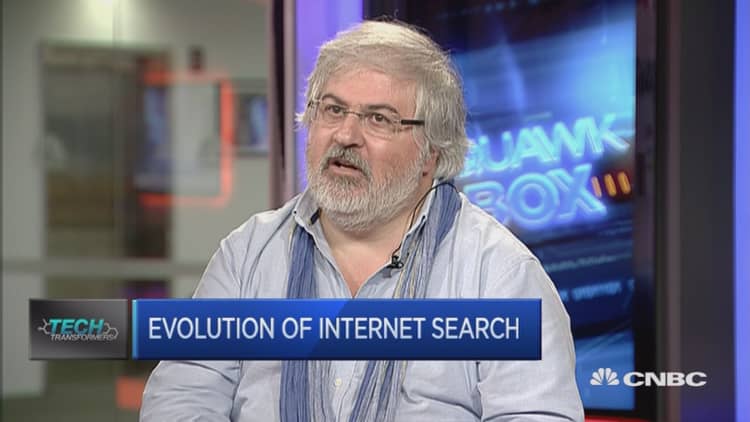

Start-ups are hoping new artificial intelligence (AI) techniques that make searching the web more like talking to a friend will help them take on Google.
Companies are developing search software that understands natural language, something that has typically been difficult for computers to do.
Israel-based start-up Twiggle has come up with a solution specifically for e-commerce. The company, backed by Chinese online shopping giant Alibaba, is trying to help make searching sites for items a lot easier.
"We are trying to bring the search experience as close as possible to the positive aspect of the in-store experience," Amir Konigsberg, chief executive of Twiggle, told CNBC in a phone interview on Wednesday.
"In-store, you have an interpersonal dialogue with a sales person who helps you buy what you want. You don't say you want a 'jacket black size 42'. You say: 'Hey I want a black jacket, I want to look smart because I've got a wedding tomorrow.' That's the experience we are replicating online, to bring a much more human aspect to search."
This kind of search requires natural language processing, an area of AI that is seen as the future of the industry.
Ordering pizza in the future
FacilityLive is another company looking to make an impact in search through AI techniques. The Italian start-up, which has raised around 30 million euros ($34 million), is betting its technology can make an impact in the Internet of Things (IOT). This relates to everything from smartwatches to buildings being connected to the internet.
Gianpiero Lotito, CEO and founder of FacilityLive, explains that with an increasing amount of items being connected to the IOT, more personal data will be produced. At the same time, governments are likely to digitize personal data such as health records or taxes. In this way, users will have a wealth of information about them available online, but current search solutions are not up to scratch in order for a person to trawl through their own data.
"The need to have tools to access the information and to organize things, and to have a more precise search, is the real battlefield of the future," Litito told CNBC.
The Italian founder gives an example of a so-called "connected city", where traffic information and cars are connected. He said that search could play a role in the way we get information in the increasingly connected world.
"For example you want to go to eat a pizza with certain characteristic in a place you love, you want to make a reservation. So from your car with your display, you can reserve your place in the restaurant and ask for the menu and choose your pizza. When you are near the restaurant, the city gives you information to your car, where the nearest garage is, and where you have more places and the price. You can do this all via search. This is the real revolution," Lotito told CNBC.
Disruptors?
But it's not likely to be an easy path for either of these start-ups because the titans of the industry are already working on similar solutions. Amazon owns a software called A9 which is working on visual search, allowing users to point their phone at items and find them online, as well as more complex text-based search. And Google is also boosting its AI and natural language search capabilities.
The U.S. giants have deep pockets and scale, but both Twiggle and FaciltiyLive are confident that they can take on the industry's biggest players.
"Think Apple against Ericsson, Sony and Nokia, 12 years ago. It seemed impossible for Apple to win but they won because they had better execution," Lotito said.





